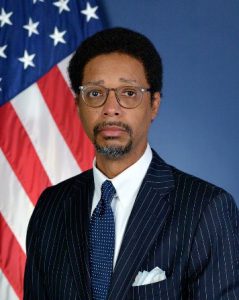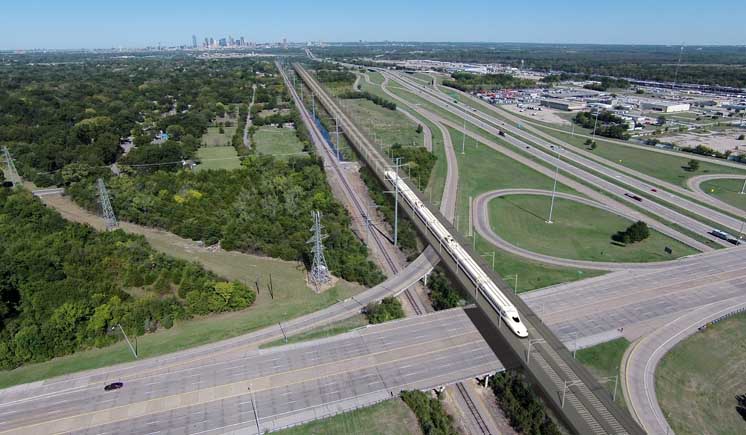
PORTLAND, Maine — Surface Transportation Board Vice Chairman Robert Primus says railroads need to improve service in order to regain traffic lost to trucks over the years.
“One of the biggest areas of concern that I have … is in the area of service,” Primus told the North East Association of Rail Shippers on Thursday. “I think there are a number of service concerns that have been around long before I’ve been on the board. There are some that have been around longer than I’ve actually been alive. I think it has challenged the network and it is impeding the network’s ability to grow beyond existing customers.”
Primus, a longtime congressional staffer who joined the board in January, said railroads need to rise to the challenge posed by more reliable trucking.
“Service has taken a bit of a back seat to operating ratios, profits, buybacks, and stock dividends,” Primus says.
“I really want to see improvements in service,” Primus says, noting he wants to work with railroads and shippers to make it happen.
Precision Scheduled Railroading is, by definition, a good thing that should improve service, Primus says. But the implementation of E. Hunter Harrison’s operating model across the industry has been a bumpy road that has led to problems for shippers and a deep reduction in rail labor.
Primus’s comments echo those made by STB Chairman Martin J. Oberman in recent months, suggesting the board may take a more activist role than it has in recent years. Oberman has been critical of Wall Street’s influence on the industry and has encouraged the Class I railroads to focus more on traffic growth and investment in the network.
The STB has a big agenda, and has talked about implementing reciprocal switching, making it easier for shippers to challenge rates, tackling Amtrak on-time performance issues on host railroads, and regulating some commodities that are currently exempt from board review.
Yet the board has a relatively small toolbox. How can the STB encourage railroads to increase capital investments, provide better service, and focus less on profit margins and more on volume growth?
“That’s the brass ring question right there,” Primus says. “We may not have the biggest toolbox, but I think we have what we need in it to help … bring about the type of change that I believe is needed to improve service, efficiency, and effectiveness, and to spur development and investment in the network.”
“There are tools that we haven’t used in the past. There are newer tools that are at our disposal that we can utilize. And I want to use them all. I do. My goal is to improve the network, enhance the network while I’m there,” he adds.
“My job is actually to get under the hood, take the tools that we have, and try to supercharge this effort to get it moving. Some things people won’t like. Some things people will like. I’m open for that debate and that dialogue,” Primus says.
Independent analyst Anthony B. Hatch, who addressed the NEARS conference on Friday, was critical of the direction the STB is heading.
Board members are smart and personable people who don’t understand economics well and certainly don’t understand investors, Hatch says. Implementing some form of reciprocal switching, for example, would be a disincentive for railroads to invest in their physical plants, Hatch says.
Hatch also said the board’s criticism of PSR was off the mark. The Canadian railways, which implemented PSR first, are growing and provide good service, he notes. The big three U.S. systems that have adopted PSR – CSX Transportation, Norfolk Southern, and Union Pacific – would have pivoted to growth last year if not for the economic disruption caused by the pandemic, Hatch contends.














Can Mr. Hatch really be considered an “Independent Analyst” when he is paid by the railroads as a consultant?
I had to work with many Federal employees of all levels over 40 years. The good ones who actually had ability got frustrated, took early retirement, and went elsewhere to work. Those that lasted for their entire job career were not impressive when dealing with them.
“Primus, a longtime congressional staffer who joined the board in January…” tells you all you need to know. Probably has never held a job in the private sector and knows little about the subject other than from reading reports, graphs and charts. Likely railroad marketing departments already know more than he can add.
What is the STB’s solution? More regulation? What could possibly go wrong?
I don’t know why Trains gives any consideration to what Hatch has to say. I’m tired of reading his comments that often miss the mark. Further, his comment about reciprocal switching being a disadvantage to investing in railroad physical plants… …the railroads have been buying about a billion of their own stock each year over the last decade, surely they could spend that money on their physical plant instead if they cared & didn’t want to scrape by & did something useful other than impress Wall Street. Yet Hatch ignores this simple logic.
STB better get serious if they’re going to do anything with the railroads. The clock is ticking & they will fight tooth & nail.
I don’t know why Trains still listens to Hatch. He kept saying that the STB would approve the CN deal for KCS, and then when STB wouldn’t approve, Hatch said he wasn’t surprised.
Both are right. Both are knowledgeable and well spoken. . Anthony Hatch and Robert Primus both have points to make. Mr. Primus of STB is correct in saying the railroads need to up their service game. Mr. Hatch of the private sector is right in saying that Democrats don’t understand economics.
Democrats may not understand economics…but they certainly do understand Wall Streets negative impact on businesses by looking at the short term instead of the long term. Since when did it become more important to earn that return now instead of a steady return over 20 – 30 years, the vast majority of people(including Wall Street types) need to work at least 30 years before retirement, they don’t need that money now, they need it in 30 years…that’s the purpose of long term investment. Perhaps there needs to be regulations on short term gains for Wall Street that deemphasizes them and promotes long term growth instead.
Sorry Charles but Hatch is off the mark again other than to his shareholders, which are getting annoyed with him. As for bringing politics into this thread yes Democrats do understand economics more so than trickle down theories.
Two thumbs up Mark!!!!1